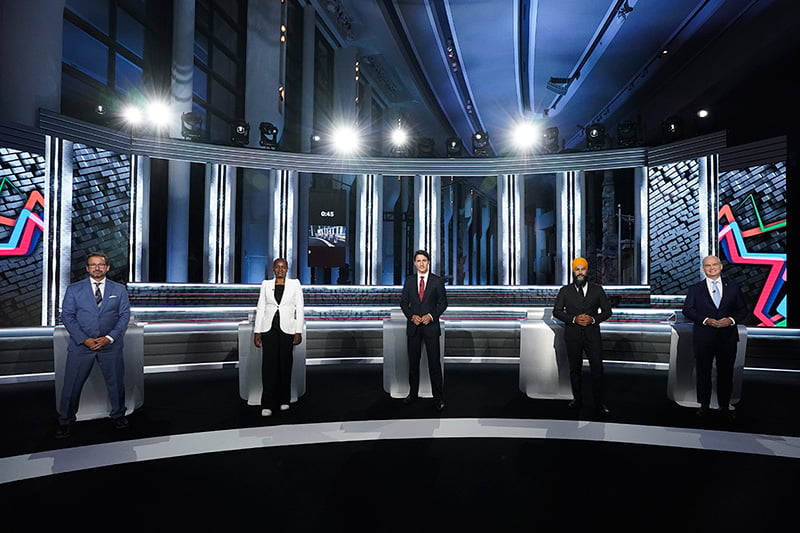[Editor’s note: This is an abridged version of a story that first appeared in our pop-up election newsletter, The Run. Sign up here to get new issues sent directly to your inbox every Tuesday and Thursday until election day.]
According to an Ipsos poll released this week, apparently nearly all Canadians now agree that racism is “a harmful thing.” Some good news!
Racist attacks against Asian-Canadians and Asian people living in Canada have risen significantly since the COVID-19 pandemic was declared in March 2020.
We’ve also witnessed the various ways COVID is more likely to hurt racialized people, not just in health outcomes but in economic consequences, too.
It’s been four months since the Tk'emlúps te Secwépemc First Nation found the remains of 215 children at the former Kamloops Indian Residential School, setting off a chain of further discoveries across Canada and prompting a long overdue post-Truth and Reconciliation Commission conversation about Canada’s residential school system and its legacy of genocide.
And about three months ago, four members of a Muslim family were murdered in a van attack in London, Ontario, leaving a nine-year-old boy in serious condition. Police believe they were targeted because of their faith, a horrific case of Islamophobia.
And there are countless everyday events that don’t draw headlines. The same Ipsos poll found that 65 per cent of respondents who identify as non-white have experienced racism.
So you’d think that this would be an important election issue. And you’d expect that it would get a substantial amount of time in the federal leaders’ debates last week.
It turns out Canadian politicians will talk tough about fighting racism and going hard after people who commit hate crimes. But when it comes to actually taking a stand, even just in a debate, never mind pushing forward policies that could address racism, they dance around it.
To be fair, there was one revealing moment in the debate when the issue of racism did come up that has been extensively covered since — just not in a meaningful or constructive way.
Early in the debate on Sept. 9, Angus Reid Institute president and debate moderator Shachi Kurl directed a question that touched on Quebec’s Bill 21 to Bloc Québécois Leader Yves-François Blanchet.
“You denied that Quebec has problems with racism, yet you defend legislation such as Bills 96 and 21 which marginalize religious minorities, anglophones and allophones. Quebec is recognized as a distinct society but for those outside the province, please help them understand why your party also supports these discriminatory laws,” asked Kurl.
(Bill 21, which banned the wearing of religious symbols like crosses, hijabs and turbans for many state workers in the province, was passed in 2019. In April 2021, a Quebec Superior Court upheld most parts of the bill but struck down others. Quebec plans to appeal the decision, as do other groups.)
“Those laws are not about discrimination. They are about the values of Quebec,” Blanchet said. “We are saying that those are legitimate laws that apply on Quebec territory and there seems to be people around here which share this point of view.”
Since then, Blanchet has grumbled about the question and the major federal party leaders — Liberal Justin Trudeau, Conservative Erin O’Toole and New Democrat Jagmeet Singh — have condemned it and called for an apology.
“The premise of the question was wrong and quite frankly insulting to Quebecers. We know there is lots of work to do across the country to fight against systemic discrimination, to stand up against intolerance,” Trudeau said later.
“It’s a mistake to imply that only one province has a problem with systemic racism when it’s a problem everywhere in Canada,” Singh told the Globe and Mail. “Implying that it’s only in one province hurts the work being done to fight systemic racism.”
“We’re tired of Quebec-bashing and singling out Quebec, and I think the consortium should recognize that and apologize,” said O’Toole.
Instead of taking the opportunity to discuss the ways that racism has had real consequences on the lives of people across Canada, and in Quebec, the major leaders made the question into a referendum on whether Quebecers are racist.
I too take issue with the debate question. But not because it went too far — it didn’t go far enough.
I know there’s only so much time in a debate, and the leaders want to win seats in Quebec.
But the fact is that the leaders ignored an opportunity to talk about the ways racism and discrimination show up in laws and policies across Canada, both historically and today, and what should change.
They chose instead to spend the last week competing to see who can most loudly defend Quebecers from “offensive” and “insulting” questions, even though no one actually called Quebecers racist.
Nor did they opt to reflect, throughout the debate, on how racism factors in every issue, from the pandemic and health care to the impacts of climate change to the poisoned drugs crisis to housing.
Currently the only person taking heat for a question that tried to examine the way discrimination shows up in Canada is the journalist who asked it, and unfortunately that isn’t surprising. Allegations of racism are often seen as more offensive than the existence of racism itself.
This misplaced outrage also ignores the fact that challenging and criticizing policies are crucial to ensuring systems remain fair and just. Asking politicians these difficult questions is in the journalist’s job description. The responsibility of a federal leader in that moment would be to either clarify or defend their position, not attack or dodge the question.
Instead of side-stepping the question, the leaders could have brought Canadians into a discussion on the nature of racism and how racism manifests in Canadian society. They could have expanded on their actual platform positions and plans to address systemic racism. We got a political circus instead.
The good news is that when leaders shirk responsibility, everyday people can take the lead on thorny and uncomfortable issues. We can read the platforms, talk about crucial issues with others and force riding candidates to talk more about how we will address racism across Canada.
This is a country founded and built on dispossession and oppression of Indigenous peoples, racist policies around immigration, and maintaining dismal outcomes in every facet in the lives of racialized people in this country.
These are big topics and no doubt difficult to parse. But that’s what makes them even more important to address.
The unfortunate truth is that there won’t be any serious action challenging racism in this country until its citizens look into the mirror, actually reckon with what they see, and demand changes. Because the federal leaders sure as hell won’t.
THE RUNDOWN
Additional readings reeled in from around the web.Just Talk: Maan Alhmidi’s Canadian Press primer on what the parties are saying, and aren’t saying, about racism in this election is essential reading.
Paper Trail: Earlier this year, my colleague Christopher Cheung wrote about the many documents used to monitor Chinese residents in Canada in the early 20th century — a pretty vivid illustration of how racism can be baked into bureaucracy.
Another Debate Take: Read Emilie Nicolas’ interesting column in Maclean’s about the debate and the question from the perspective of a Quebecer that had some clarifying notes about the origins of Bill 21. ![]()
Read more: Rights + Justice, Federal Politics, The Run

















Tyee Commenting Guidelines
Comments that violate guidelines risk being deleted, and violations may result in a temporary or permanent user ban. Maintain the spirit of good conversation to stay in the discussion.
*Please note The Tyee is not a forum for spreading misinformation about COVID-19, denying its existence or minimizing its risk to public health.
Do:
Do not: